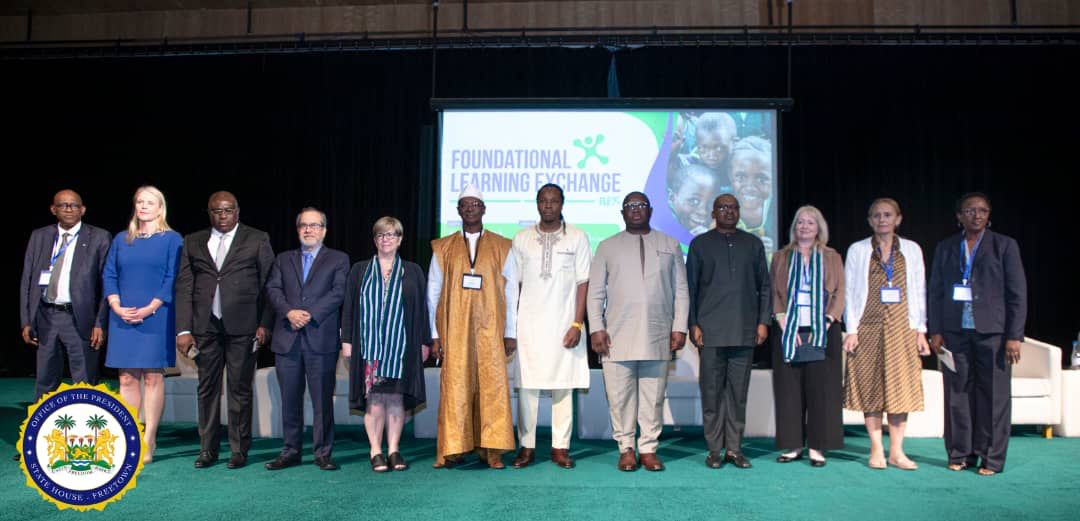Sierra Leone Hosts African Countries on tackling Learning Poverty
Sierra Leone’s Ministry of Basic and Senior Secondary Education (MBSSE) is serving as the host to seven other African countries on the First Foundational Learning Exchange (FLEX) in a bid to create an equivalent to the World Education Forum that’s focused on foundational learning.
Participating countries are Sierra Leone, Gambia, Ghana, Liberia, Ivory Coast, Malawi and Nigeria and senior development leaders including the World Bank Global Director for Education Jaime Saavedra.
President Bio who Co-Chair the UNESCO HighLevel Steering Committee on Sustainable Development Goal 4 (SDG 4), convened the inaugural Foundational Learning Exchange at the Freetown International Conference Center, Sierra Leone, on February 6-7.
The exchange assembled ministers of education, civil servants, teachers, NGOs and international partners to re-commit to improving learning outcomes for children and exchange solutions for acceleration progress.
In his statement, President Julius Maada Bio said, Sierra Leone identify closely with the vision statement from the UN Secretary-General on transforming education, in which he called for students to be able to learn, noting that through the Freetown Manifesto, Sierra Leone is building regional support for transforming education.
“I hosted the spotlight session on Foundational Learning alongside the President of the World Bank and the Executive Director of UNICEF. As a global champion for transforming education and meeting our SDG 4 goals by 2030, I have also selected foundational learning as a focus,” he said.
According to the President, Sierra Leone’s work in education is underlined by four simple principles; firstly, Sierra Leone believe that education is a fundamental right and not a privilege, secondly, Sierra Leone believe that in the exercise of that fundamental right, access to education must be universal, equal, comprehensively safe, and radically inclusive of all genders, abilities, pregnant, rural-dwelling, all ages, and all socio-economic backgrounds.
“We have added one million more learners, especially girls, achieved gender parity in basic education, and registered higher achievement outcomes for girls. We also cater to specialised learning and teaching materials and provide hot school meals in poor and deprived areas. We have proved that gender parity is possible; girls are high achieving learners; with free education, from pre-primary through university, for girls who study STEAM (Science, Technology, Engineering, Agriculture – in our unique case–, and Mathematics) disciplines, unprecedented numbers of girls have enrolled in these STEAM courses since the introduction our flagship free-quality school education programme,” he said.
He said thirdly, Sierra Leone believes in training its highly resourceful and talented teachers and school administrators at the highest levels, partner with communities, leverage technology, and predicate a rich and innovative curriculum based on five key competencies (the five “Cs”) –Creativity, Comprehension, Critical Thinking, Computational Thinking, and Civics.
“Finally, we believe that education is not a cost; it is an investment. It is the best investment we can make for an inclusive and sustainable future for our country. There is recognition among global leaders that SDG-4 remains the best accelerator for achieving all the Sustainable Development Goals. My arguments on the global stage have been informed by these fundamental principles,” he said.
The Minister of Basic and Senior Secondary Education Dr. Moinina David Sengeh thanked his colleague Ministers for coming to Freetown for the learning exchange.
“What started as a conversation in Paris, in London, in New York in small rooms in 2021/2022 with likeminded friends has today become a reality. Thanks to the United Nations Secretary General five Global Champions of education inclusive of my President. To this moment, it still feels like a dream to proudly say we are hosting the first Foundational Learning Exchange between African Countries and leading global organisations to prioritize conversations around the foundamental stages of the child’s development,” he said.
He said Sierra Leone is actively working in expanding access to education since President Bio came to power through the introduction of the Free Quality School Education (FQSE) Programme.
Director of the UNESCO Institute for Statistics Dr Silvia Montoya encouraged nations to come together and embrace foundational learning, adding that “If the children cannot learn to read; they cannot read to learn.”
She calls on African leaders to own up to their commitment in improving foundational learning in their countries.
The World Bank Global Director for Education Jaime Saavedra emphasized the negative impact of learning poverty among countries in Sub-Sahara Africa, noting that all Heads of State must come together and fight against such learning poverty.
“With 7 in 10 of today’s 10-year-olds in low- and middle-income countries now unable to read a simple text, political leaders and society must swiftly move to recover this generation’s future by ensuring learning recovery strategies and investments,” he said.


